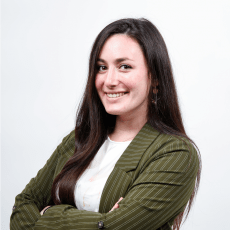Jade Iafrate

A week before Europe Day, we found for this portrait a young graduate very committed to the subject. While Jade Iafrate has long been the School’s No. 1 ambassador, today she navigates between Warsaw, Brussels and Marseille, driven by a constant passion: Europe.
Could you introduce yourself?
My name is Jade and I am an alumna of the Malala Yousafzai class! After a third year internship in Montreal and an Erasmus in Prague, I decided to specialise in issues related to the European Union. For this reason, I chose the european Policies and Transnational Action directed by Philippe Aldrin and Audrey Freyermuth. I specialised in gender equality issues and their promotion within the European Union, with a particular interest in Central Europe.
What do you remember from your years at Sciences Po Aix?
One day, during a conference at the Salon de l’Étudiant, a journalist asked me how I would define Sciences Po Aix. I replied that it was a school for the curious. And for good reason, this School has the power to bring together students who all share this quality. These five years are as different as they are rich in lessons! During my second year, I had the opportunity to create Saport’actu, and then the Media Office, with the help of highly motivated people. This type of experience is essential to acquire professional skills in parallel with the academic curriculum, it is what really makes the soul of Sciences Po Aix! This is why the best advice I could give to the people of Aix would be: get involved in all the projects that are close to your heart and above all carry them out, this is the real plus of your training in this beautiful institution where you already have access to a complete academic content!
You are a young and convinced European, what do you think are the pillars of tomorrow’s Europe?
The European Union is an inter-state construction whose creative idea is based on the guarantee of peace. It pushes states to identify, define and promote a set of values. In our courses, we learn that Europe is based on economic and legal pillars. For me, it only exists because of the will of the countries that wanted to join it and, in the end, it will only live because of it. In my opinion, the Europe of tomorrow is already here, it is taking shape through historic decisions that are intended to show greater solidarity between its members, as was the case with the pandemic. Moreover, I think I can say that my generation has grown up with Europe, criticising it, but never totally rejecting it (at least I hope so!).
On the other hand, the greatest challenge facing Europe remains in this very reflection. If we want more than an economic Europe, we must give a seat to the Union of values and invest more monetarily and politically in this portfolio of ideas. For example, the issue of gender equality is increasingly being promoted at this level, and is pushing towards a uniform legal framework for equal pay or better protection against violence against women. However, each country needs to value this attempt and support it by implementing the European directives in an optimal way.
Finally, I also think that the key lies in Central Europe. The historical understanding of what this central space is and can be is a necessity if we want to coordinate our actions at 27. The war in Ukraine is definitely a redistribution of the cards that places the leaders of this space in the front line. It now remains to be seen whether the V4 group (Hungary, Slovakia, Czech Republic and Poland) is ready to take up the challenge!
And today, where do you stand? What are your projects?
Currently, I am living in Warsaw as a student at the College of Europe Natolin campus. After having benefited from an enriching experience at the European Commission where I worked on gender equality, I decided to continue my studies in order to better specialise in the EU’s neighbourhood policies. Having benefited from the Director’s courses on the Mediterranean Partnership, my curiosity led me to learn more about the Eastern Partnership. At that time, I had no idea that a war would break out on the other side of the Polish border, causing thousands of women and children to flee. I must admit that being here was a real turning point for me. Now I would like to get involved and bring my expertise on gender issues to assess and measure the cost of the Russian invasion of Ukraine in terms of violence against women. I am not against the idea of staying in Central Europe or going back to Brussels to carry out this objective… to be continued!